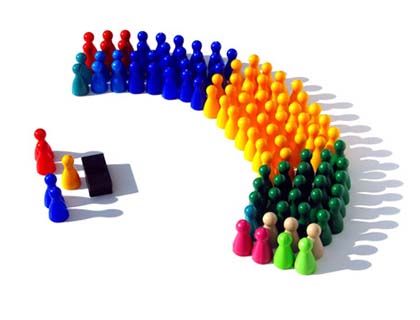State, according to the German Sociologist Max Weber, is any “human community that claims the monopoly of the legitimate use of physical force within a given territory”; hence, “the modern state is a compulsory association which organizes domination.” In other words, Weber describes the state as any organization that succeeds in holding the exclusive right to use, threaten to use, or authorize others to use direct physical violence against members of its territorial domain.
Weber defines the state as a community successfully claiming authority on legitimate use of physical force over a given territory; territory was also deemed by Weber to be a prerequisite feature of a state. Such a monopoly, according to Weber, must occur via a process of legitimacy.
His expanded definition was that something is “a ‘state’ if and insofar as its administrative staff successfully upholds a claim on the monopoly of the legitimate use of physical force in the enforcement of its order.” M. Weber’s concept has been put in a theoretical model to show that the two-fold concept - the use of force by the state and its monopolization - is beneficial from a social welfare point of view. However, the positive welfare effects depend on the state to be sufficiently benevolent and not turn against its citizens.
According to Weber, the state is the source of legitimate physical force. The police and the military are its main instruments, but this does not mean that only public force can be used, private force can be used too, as long as it has legitimacy derived from the state.
Weber intended his statement as an observation, stating that it has not always been the case that the connection between the state and the use of violence has been so close. He uses the examples of feudalism, where private warfare was permitted under certain conditions, and of Church courts, which had sole jurisdiction over some types of offenses, especially heresy and sexual offenses.
The actual application of violence is delegated or permitted by the state. Weber’s theory is not taken to mean that only the government uses violence, but that the individuals and organizations that can legitimize violence or adjudicate on its legitimacy are precisely those authorized to do so by the state. So, for example, the law might permit individuals to use violence in defense of self or property, but in this case, as in the example of private security above, the ability to use force has been granted by the state, and only by the state.
One will ask that how the state came to existence and what are its origins. There are some theories about the origins of state to be viewed shortly.
According to “Natural Theory”, the social urge of the human being to be within a group of people in the community as in sociology describes that “man is a social being.” The social group provides the political development to stay and work together with common standard law in the community later on transform as a state.
Based on “Patriarchal Theory”, the origin of the state evolves from the enlargement of family under the authority of the parents or the elders. Later on, it will develop into a tribe, kingdom then state.
The “Force Theory” believes that the creation of the state through the constant war and invasion of the great warriors in the ancient time dominated the weak that later on formed a state.
However, “Devine Right Theory” believes that the rulers of the past advocated the political dominance of authority and power through their own ordained mandate that they represented the state as on the basis of the divine right. It was in this nature that the divine rights of kings have the absolute power and influence over the subjects.
According to “Social Contract Theory”, this is the right of the people to have the deliberate and voluntary contract on the right to overthrow the kings and rulers against corrupt governance to organize a new government with common interest for all the people.
Legitimacy is a key element of the state which will be obtained through inheritance, charisma or democracy. Without legitimacy a government may fall. However, with legitimacy, a government can enjoy the freedom to implement a range of policies. Robert Dahl, an American political theorist, describes legitimacy as being like a reservoir: if it stays at a high enough level, governing is straightforward; if it falls below a certain level, governing can become difficult. Hence, legitimacy depends in part on how citizens view the state, because the state in a democracy rests on the will of its citizens.
However, legitimacy does not depend solely on the views of citizens. Max Weber argues that states seem partly to create their own legitimacy. According to him, the state is the most powerful institution or agent within a particular nation because it has the ability to use force. This ability may be exercised only rarely, but is something the state always keeps as an option. In claiming the right to use force, the state at the same time calls any other institution’s or group’s use of force illegitimate, unjustified.
Legitimacy therefore has two sides to it: on the one hand it is necessary to and derived mainly from democracy and it is dependent upon the will of the people. On the other hand it is something which the state itself tries to create partly independently of its citizens. The two sides taken together suggest that legitimacy is not something which a state or government has once and for all, but rather is something it tries constantly to generate and maintain, often in the face of a variety of challenges.
One will easily conclude that the more democratic a state is the more it can claim that it is legitimate.

